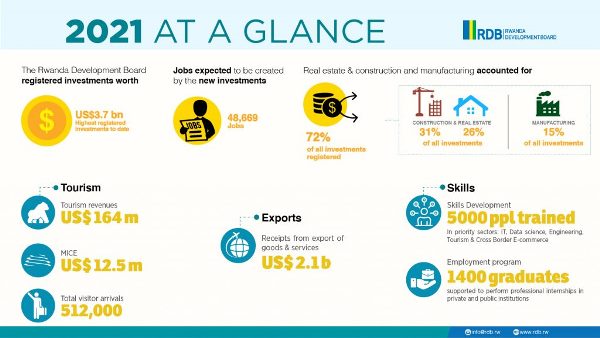
Infographic-data-2021-Investments
In 2021, Rwanda Development Board recorded growth in key sectors that include investment registration, tourism, exports and skills development compared to 2020. The year 2020 was characterized by the global economic slowdown that resulted from the impact of COVID-19.RDB registered investments worth US$3.7 billion in 2021, up from US$1.3 billion in 2020. This is the highest investment registration to date, and was driven by strategic investment projects. The new investments are expected to create 48,669 jobs – representing a 97% increase from the previous year. The government aims to create 214,000 new jobs from investments and other employment sources every year.
Economic sectors that attracted the most significant registered investments in 2021 include Construction, Real Estate, and Manufacturing (including agro-processing), which accounted for 72% of all investments registered. Construction accounted for 31%, Real Estate 26%, and Manufacturing (including agro-processing) 15%. Other sectors that attracted significant investment are Financial and Insurance Services, Agriculture, Accommodation and Food Services, Energy, Health and ICT.
Growth of investments in Construction, Real Estate, Manufacturing and Agro-Processing is attributed to the Manufacture and Build to Recover program that provides tax incentives to investors in these sectors. This is in addition to the New Investment Code that has made it easy for investors to thrive in Rwanda.
Some of the investments registered in 2021 include; US$ 237.9 Million by Ultimate Developers Ltd for the development of Vision City, Phase Two, a US$145.9 Million investment by Rwanda Ultimate Golf Course Ltd into the Kigali Golf Resort and Villa Project, a US$20.7 Million powdered milk project and a US$22.5 Million by Global Electric Vehicle Ltd to manufacture Electric Vehicles.
Tourism was one of the sectors heavily impacted by the COVID-19 pandemic. The government implemented several initiatives to revive the sector, including the Rwf100billion Economic Recovery Fund, half of which was dedicated to tourism and hospitality.
Tourism revenues increased by 25%, from US$131 million in 2020 to US$164million in 2021. The MICE sector generated US$12.5 million in 2021 compared to US$5.4illion in 2020. Total visitor arrivals increased by 2.8%, from 490,000 in 2020 to 512,000 in 2021. Sports events hosted during this period significantly contributed to visitor arrivals and revenues.
In exports, receipts from the export of goods and services increased by 9.4%, from US$1.9 billion in 2020 to US$2.1 billion in 2021. This growth is attributed to the gradual opening of international supply chains in 2021.
In Skills Development, over 5000 people were trained to bridge the skills gap in priority sectors such as information technology, data science, engineering, tourism and cross border E-commerce.
Under the employment program, over 1400 fresh graduates were supported to perform professional internships in private and public institutions. In partnership with the Business Development Fund, over 1000 Micro, Small and Medium Enterprises (MSMEs) were supported with guarantees to access financing in different financial institutions.
Additionally, over 8500 MSMEs were coached in business development by Business Development Advisors and acquired business development skills. Among these, 85% accessed finance in different financial institutions, mainly SACCOs.
Commenting on the 2021 performance, RDB Chief Executive Officer, Clare Akamanzi, said:
“The 2021 performance demonstrates the gains of our economic recovery efforts. In investment registration, not only have we surpassed our pre-pandemic figures, but we also registered the highest investment registration to date. Achieving this feat against the odds of the pandemic that has negatively impacted the world economy is a sign of continued investor confidence in Rwanda by both local and foreign investors.
As the world economy continues to open up, we are optimistic that we will register more growth in tourism, exports, and other critical sectors this year. We are committed to ensuring that Rwanda remains one of the most competitive economies in Africa and the world.”
The growth trajectory is expected to continue in 2022. It will be aided mainly by manufacturing and construction investments, regional and international trade, and anchor projects such as the Kigali Innovation City.
The Rwanda Development Board is a government agency responsible for leading the country’s transformation into a dynamic global hub for business, investment, tourism and innovation. Its mission is to fast track economic development in Rwanda by enabling private sector growth. (End)
